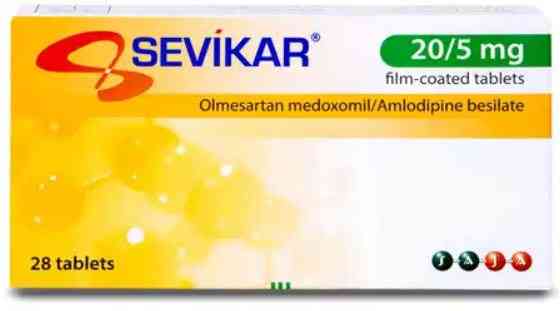
SEVIKAR 20/5 Price
Active Substance: Amlodipine (as besilate), Olmesartan medoxomil.
Overview
Welcome to Dwaey, specifically on SEVIKAR 20/5 page.
This medicine contains an important and useful components, as it consists of
Amlodipine (as besilate), Olmesartan medoxomilis available in the market in concentration
Name
Amlodipine + Olmesartan Medoxomil
Precaution
Drugs that act on renin-angiotensin system can cause fetal injury and death when used in 2nd and 3rd trimesters of pregnancy. Olmesartan medoxomil should be discontinued as soon as possible once pregnancy is detected. Symptomatic hypotension may occur in patients who are volume- and/or salt-depleted. May be associated with oliguria, progressive azotaemia, and acute renal failure (rare). Patients with bilateral or unilateral renal artery stenosis may have increased risk of severe hypotension and renal insufficiency. Caution in renal impairment; monitor serum creatinine and potassium levels periodically. Avoid use in severe renal & hepatic impairment. Caution in patients with aortic or mitral valve stenosis, obstructive hypertrophic cardiomyopathy. Patients with primary aldosteronism may not respond to angiotensin receptor antagonist. Not recommended in lactation. Lactation: It is not known whether the amlodipine or olmesartan are excreted in human milk. Because of the potential for adverse effects on the nursing infant, a decision should be made whether to discontinue nursing or discontinue the drug, taking into account the importance of the drug to the mother.
Indication
Hypertension
Contra indication
Pregnancy; biliary obstruction.
Side Effect
>10% Peripheral edema (11%) Frequency Not Defined Palpitation,Nocturia,Urinary frequency,Orthostatic hypotension,Pruritus,Rash Potentially Fatal: Acute renal failure.
Pregnancy Category ID
17
Mode of Action
Amlodipine relaxes peripheral and coronary vascular smooth muscle. It produces coronary vasodilation by inhibiting the entry of Ca ions into the slow channels or select voltage-sensitive channels of the vascular smooth muscle and myocardium during depolarisation. It also increases myocardial oxygen delivery in patients w/ vasospastic angina. Olmesartan is a selective and competitive angiotensin II Type 1 (AT1) receptor antagonist that blocks the vasoconstrictor and aldosterone-secreting effects of angiotensin II. As a result, olmesartan relaxes blood vessels, hence lowering BP and increases blood supply and oxygen to the heart.
Interaction
Additive effect when used with catecholamine depleting drugs; monitor for hypotension and/or marked bradycardia. If used with clonidine, clonidine withdrawal should occur a few days after withdrawal of the beta-blocker to prevent rebound hypertension; if replacing clonidine by beta-blocker, beta-blocker should be introduced only after clonidine administration has stopped for several days. Concurrent use with prostaglandin synthase inhibiting drugs (e.g. indomethacin) may reduce the hypotensive effects of beta-blockers. Increased risk of hyperkalaemia w/ ACE inhibitors, K-sparing diuretics, K salts or K supplements and drugs that may increase serum K (e.g. ciclosporin, eplerenone). May potentiate BP lowering effects w/ other antihypertensives. May decrease glomerular filtration w/ NSAIDs which can cause acute renal failure. May increase serum concentrations and toxicity of lithium.
Pregnancy Category Note
Pregnancy Category: C (1st trimester); D (2nd & 3rd trimesters).
Adult Dose
Child Dose
Renal Dose
Administration
